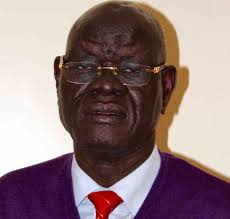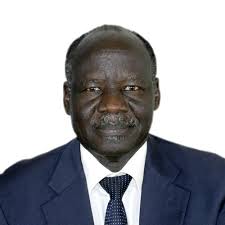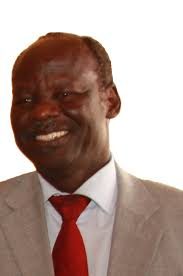AWET AKOT LETS THE CAT OUT OF THE BAG

By; Dr. Peter Adwok Nyaba
It is not possible that people who have been struggling together against a common enemy for nearly six decades could turn in the end against themselves as if nothing strategic bounded them. Many people in the civilized world find it difficult to comprehend South Sudanese leaders’ attitude towards their country and people. South Sudan has been at war since 2013 in which more than half a million people perished; four to five million South Sudanese dislocated from their natural habitat and are living in the forests, swamps, in UNMISS Protection of Civilians Camps or in Refugee Camps in Sudan, Ethiopia, Kenya, Uganda and the DR Congo. Famine and diseases like cholera and malaria are taking their toll on the people in towns and villages. Internecine fighting over grazing and cattle rusting still claim lives in the erstwhile peaceful Dinka territories. In its current social, economic and political configuration, South Sudan depicts a complete breakdown of state and a recoil to what the world was in the Stone Age era.
Not that many of us did not know the consequences of this Jieng parochial vanity, but we had hoped the logics and imperatives of constructing a state in modern times would impel prudence on the part of these Jieng chauvinists to prevent backward drift towards savagery. In a talk to the so-called ‘lost boys’ on 9 June 2017 in Syracuse, NY, transcribed and posted on the Facebook, Hon. Daniel Awet Akot, in his usual ingenious honesty, let the cat out of the bag. On piecing together, the threads of Awet’s clumsy presentation, it was possible to decipher and explain South Sudan’s current predicament.
Mr. Daniel Awet Akot was subsidiarity to the SPLM/SPLA Politico-Military High Command. In his own words, he is one of the six surviving members of that defunct body, which adamantly shunt ideological orientation and political education to raise the social awareness and political consciousness of the SPLM/SPLA cadres, combatants as well as the masses of our people during the war of national liberation. He is a member of the Jieng Council of Elders (JCE) and advisor to President Salva Kiir Mayardit. Therefore, Daniel Awet was acting in that capacity to convey official policy to the Dinka Diaspora.
The JCE comprising the Jieng political, military and business elite is the driver of Jieng ethnic nationalism and its ideology of hegemony and domination, which is an important driver of the raging civil war. Daniel Awet’s talk to Dinka audience in the USA could not have come at an opportune time and therefore warrant serious attention and response. Most of his talk impinged on policy issues aimed at engineering a false reality that only the Dinka fought for the independence of South Sudan. That all the nationalities in South Sudan, including our regional supporters, contributed in one way or the other for the independence of South Sudan goes without saying. It is therefore unjustifiable to continue to hammer this falsehood.
The message Mr. Daniel Awet delivered was not in any manner a revelation. The people of South Sudan including some Dinka compatriots have painfully been enduring the atavistic behaviour of the JCE only to enable the people of South Sudan to exercise the right to self-determination and achieve sovereignty. The dull chauvinists fail to grasp the reality that constructing Jieng ethnic state, tantamount to imposing a primitive ‘mode of production’ and archaic ‘relations of production’ on the people of South Sudan, is not only moribund but will also inflict immense suffering to the people. The politics of exclusion, discrimination and marginalization led to dismemberment of the Sudan.
The JCE, rather than the SPLM, constructed a system of governance akin to the cattle camp governance in accordance with the rule of the thumb. The cumulative effects of this governance system, whereby Jieng community leaders occupy senior positions in the executive, legislative and judicial organs of the political establishment, which outwardly occur as tribalism, nepotism, corruption, inefficiency, incompetence, impunity, insecurity and finally the civil war, have plunged South Sudan into the abyss. This is not a system Mr. Daniel Awet or any sensible individual would advocate for in a place like New York.
The Jieng social system or mode of production – pastoralism – upon which the JCE would want to model South Sudan state, lies at the lowest level of human socio-economic and cultural development. It would constitute a serious contradiction in the age of science and technology. As an acephalous society, the Jieng are in a state of perpetual segmentation and therefore never evolved a tradition of indigenous statehood or centralized authority. Therefore, the attempt to impose Jieng hegemony and domination by physical force will historically parallel the destruction of the Roman Empire by the primitive tribes of Northern Europe and Scandinavia sometimes in the medieval ages.
One aspect Daniel Awet admittedly attributes to Jieng model of governance is the corruption in the government of South Sudan since its inception in 2005. No government would tolerate the theft of a staggering figure of US$25 billion. However, that nobody has been taken to the courts of law means that this theft came in the context of Salva Kiir’s project of economic empowerment of Jieng individuals and businesses christened ‘payback time’. The ‘dura saga’, the ‘Letters of Credit saga’, the ‘crisis management committee saga’, the ‘Nile Pet saga’ and the ‘theft in the Office of the President saga’ all link to Jieng individuals and businesses. The JCE undertook this enterprise to achieve Jieng politico-economic hegemony and domination by combining the control of political and economic power.
The JCE leadership of South Sudan produced a totalitarian dictatorship, whereby President Salva Kiir governs by decrees. Unlike some benevolent totalitarian regimes that generated socio-economic development, JCE totalitarianism triggered civil war, massive impoverishment of the people of South Sudan and the bankruptcy of the state. The reason is simple; being a backward class, in terms of primitive mode of production, they did not plough into productive enterprises the billions of dollars they stole; instead stashed it in foreign lands in the form of real estate, cash in banks, luxuries cars or froze this money in form of cattle. The huge herds of cattle in Equatoria is contributing to ecological degradation and environmental pollution.
The kinship nature of the JCE modality of state in respect of those opposed sprouts in Daniel Awet’s diatribe reflecting a conversation with Mama Rebecca Nyandeng de Mabior. His question, “are you now ‘Maan baai’ or ‘Man baai’, transliterating to whether Madam Rebecca de Mabior is a ‘mother’ or ‘enemy’ of the Jieng nation’. This thinking encapsulated a social psychology – herd mentality, typical of kinship mode and relations of production that equates dissent with treachery. This explains why many Jieng intellectuals opposed to the JCE will never speak out against it openly lest they suffer social boycott.
I hope my Padang Dinka compatriots will rubbish off Mr. Daniel Awet’s falsified knowledge of Chollo (Shilluk) history. His reference to the so-called national dialogue (ND), ostensibly as the forum where the Jieng would raise issues with others, speaks volumes. Like the Establishment Order 36/2015, with which the JCE torpedoed the agreement on resolution of conflict in South Sudan (ARCISS), I believe the so-called ND will be another JCE ploy to coerce the other South Sudan sixty-three nationalities into accepting Jieng hegemony and domination. It is likely that the anticipated recommendations would translate into Jieng communities and their cattle herds unlimited access to land in Equatoria and Western Bahr el Ghazal, which underpins the current land grabbing and dispossession of communities of their ancestral lands inherent in redrawing of boundaries as per Establishment Order 36/2015.
Mr. Daniel Awet went at some of the SPLM Leaders former political detainees speaking of them disparagingly smacks of unveiled deep-seated jealousy. His pinch at Dr. Lam Akol and Dr. Riek Machar describing them as “two nyagats”; was uncouth as it was a hit quite below the belt. Speaking of SPLM reunification, and the Arusha Agreement between the three factions [IG, IO and FPDs], signed on 21 January 2015, nothing could be more insincere. First, the formation of the JCE consigned the SPLM to the dustbin of history, which was its raison d’être. The idea of forming ethnic caucuses in the executive and legislative organs of the government as well as ethnic and regional associations and unions in the schools and universities was to undercut the SPLM and render it dysfunctional.
The SPLM reunification, now the Entebbe process, is something different. Its contours run around certain individuals among the FPDs, which links to Salva Kiir’s quip, “what I will regret till my death bed is that I did not kill the former political detainees”. The task of the process technical advisor is to ensnare to Juba the FPDs such that Salva Kiir may have a chance on them. They should watch out.
Having discoursed Awet having let the cat out of the bag, I want to pause and ask ourselves whether the desire to erect a Jieng ethnic state in South Sudan is worth the suffering, sacrifices, tribulations and the agony the people of South Sudan are experiencing daily and a possible dismemberment of the country.
Peter Adwok Nyaba
23rd June 2017
Email: watpapit@yahoo.co.uk
Editor’s Note: The views expressed in the “Opinion Page” are solely the opinions of the writers. The veracity of any claims made are the responsibility of the author’s and are not necessarily endorsed by The Malakal Post. The Malakal Post, reserves the right to edit articles before publication. If you would like to submit an opinion article or analysis, please email your article at: info@malakalpost.com















